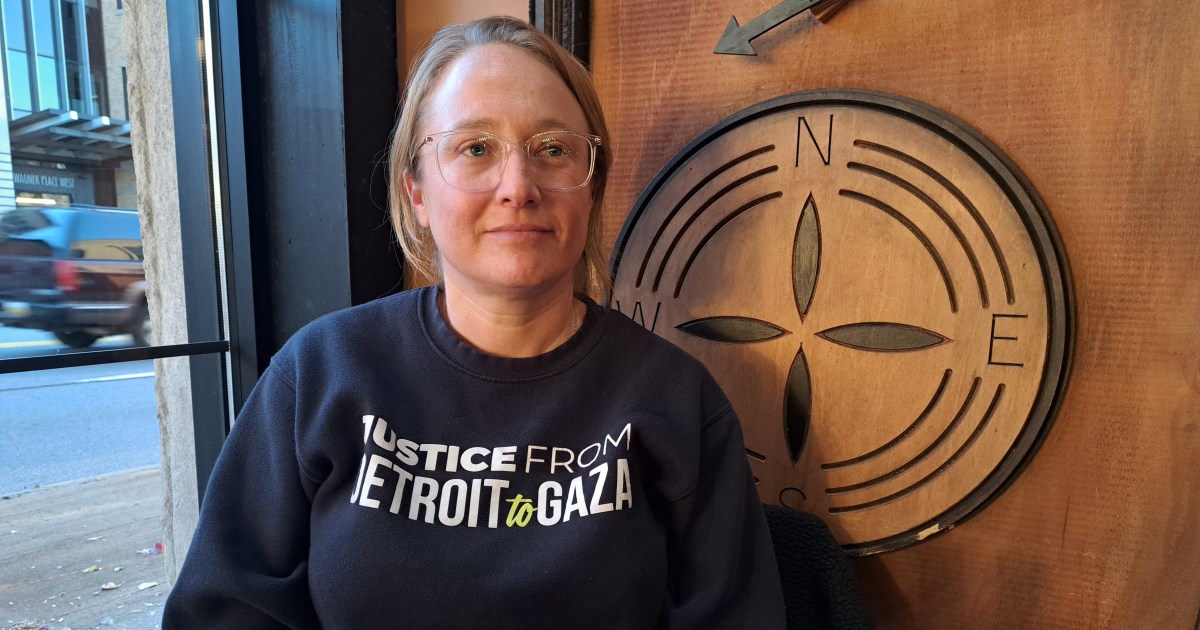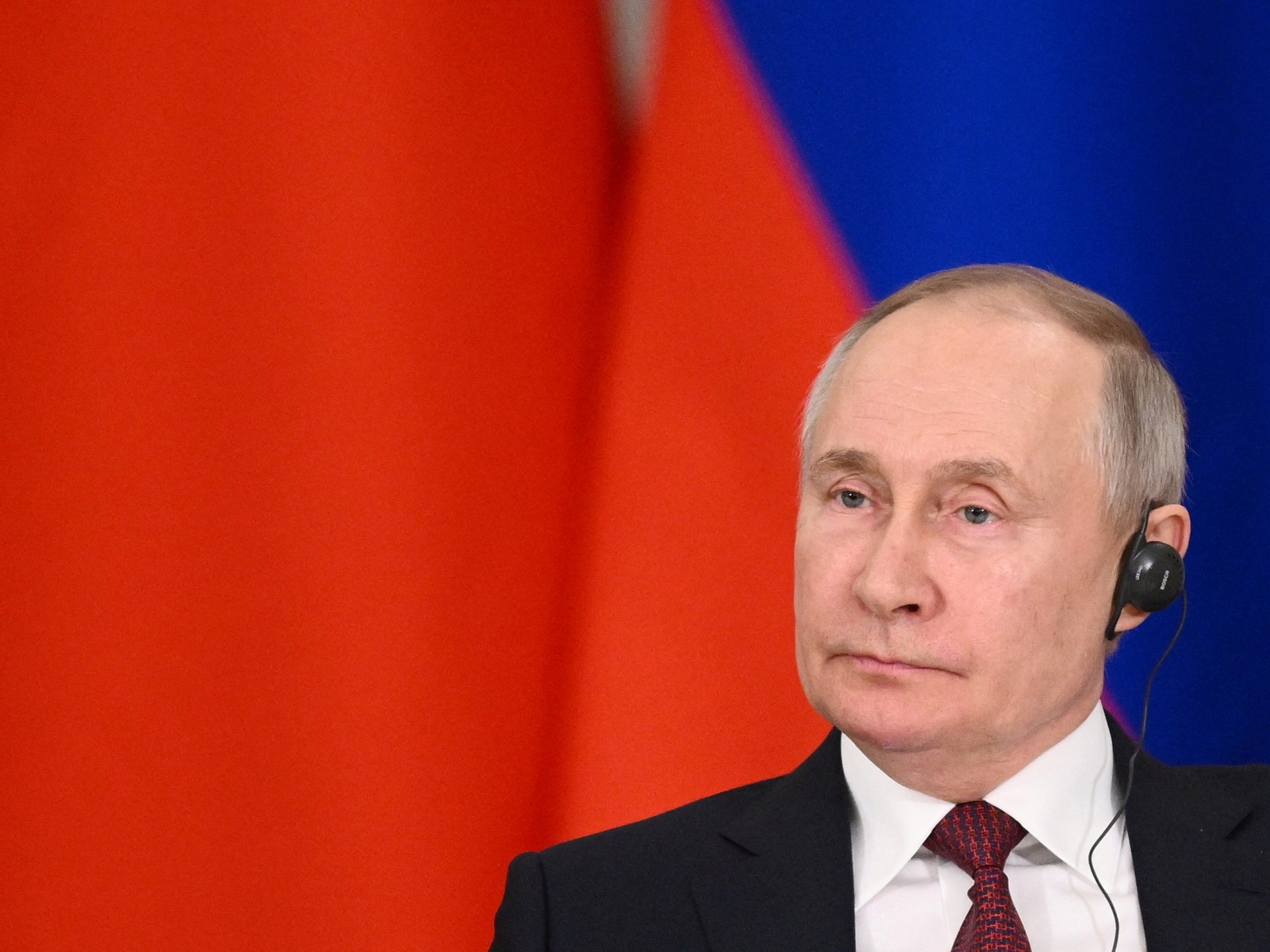Could a divided Jewish base upend US Democrats’ presidential hopes?
Dearborn, Michigan – Raised in a Jewish American household, Dana Kornberg was in her early 20s when she started to become critical of the Israeli government.
It was 2006, and Kornberg was touring Israel, as part of what is called a birthright trip, a tradition for Jewish teens and young adults.
During her travels, she saw Israeli construction workers building a tall concrete barrier to fence in parts of the occupied West Bank, a landlocked Palestinian territory. She also heard Israeli comments about Palestinians that made her uncomfortable: “They were alluded to as being dangerous.”
Those experiences made her concerned about Israel’s treatment of Palestinians — something that evoked in her parallels to Jewish oppression throughout history.
“To me, it was horrific,” said Kornberg, now a 41-year-old assistant sociology professor. “What lessons have we learned from what our people have gone through?”

Now, as Israel’s war in Gaza continues to rage, Jewish American voters such as Kornberg are grappling with the US’s role in the conflict — and how it will affect their voting preferences in the upcoming presidential election.
Jewish American voters have long been seen as a reliably Democratic voting bloc: The Pew Research Center dubbed them “among the most consistently liberal and Democratic groups in the US population”.
During the last presidential election cycle, eight out of 10 Jewish people identified as Democratic. But US policy towards Israel and the war in Gaza has since divided Jewish Americans, as well as the broader Democratic base, leading to fears of a depressed turnout.
On one hand, President Joe Biden has continued to rally strong support among Jewish voters by pledging his “rock-solid and unwavering” support to Israel, as it leads a months-long military campaign in Gaza.
That stance, however, has provoked outcry among more progressive Jewish organisations, as the death toll in the Palestinian enclave soars past 25,200.
Questions of rising anti-Semitism in the US have also mobilised Jewish advocacy groups, ahead of what is expected to be a tightly fought race for the White House in November.
A January poll from USA Today and Suffolk University showed narrow margins separating Biden from his chief Republican rival, former President Donald Trump. Biden received 37 percent support in the poll, compared with Trump’s 39.
Other surveys have shown foreign policy to be a top issue for voters this year, with a majority of Americans backing a ceasefire in Gaza, something Biden has refused to call for.
Kornberg, a member of the progressive organisation Jewish Voice for Peace (JVP), is among those protesting Biden’s stance on the war in Gaza, where United Nations experts have warned of the risk of genocide and famine.
In recent months, Kornberg has travelled from Michigan to Washington, DC, and Chicago to join demonstrations calling for a ceasefire. She was one of nearly 100 protesters arrested in November for blocking the Israeli consulate in Chicago.
Kornberg questioned whether Biden would be able to rally Jewish American voters before the general election. Even the prospect of a second Trump presidency, she warned, might not be enough to unite the Democratic base.
“I’m just not convinced that the fear of Trump is going to be enough to get [Democratic voters] to go to the polls,” Kornberg said.
She also criticised Biden for statements he made downplaying the Palestinian death toll and tying Jewish wellbeing worldwide to Israel.
“When Biden says things like, ‘The only place Jews can feel safe is Israel’, that’s a severely anti-Semitic comment because a lot of us heard it as if Jewish people shouldn’t be safe in this country,” she said of the US.

But the question of how Israel is perceived — and whether its actions in Gaza are justified — is an issue that has split Jewish American communities along generational lines.
A poll in November from the Jewish Electorate Institute found that Biden retains strong Jewish support overall: Three-quarters of participants approved of his handling of Israel’s war in Gaza.
That number dropped, however, when young Jewish Americans were viewed in isolation.
Only 53 percent of Jewish voters ages 18 to 35 approved of Biden’s stance, compared with 82 percent for other voting age groups.
Still, participants overwhelmingly backed Biden. An estimated 68 percent said they would vote for the Democratic incumbent, compared with 22 percent for Trump and 11 percent who were undecided.
Halie Soifer, CEO of the Jewish Democratic Council of America, a pro-Israel advocacy group, credited that high level of support to shared values.
“Overwhelmingly, Jewish voters support President Biden because he represents the interests and values of the Jewish community, including — but not limited to — support of Israel,” Soifer told Al Jazeera.
She also named “abortion, democracy, gun safety, climate change, the economy [and] anti-Semitism” as “key issues driving the Jewish vote”.
But Soifer added that she saw renewed party engagement after October 7, the day the Palestinian group Hamas launched attacks on southern Israel, killing an estimated 1,200 people.
“Jewish voters self-identify as Democrats over Republicans by a nearly 50-point margin. This has only been solidified in the aftermath of October 7,” Soifer explained.
Her organisation has also seen an uptick in support following the Hamas attack, she added.
Progressive and anti-Zionist Jewish American advocacy groups have likewise reported a significant bump in membership following the start of the war in Gaza.
“Since October 7, our following and base has doubled or more by nearly every measure,” said Liv Kunins-Berkowitz of Jewish Voice for Peace.
“We now have over 1.8 million followers on our social media accounts and over 720,000 people that JVP counts as our base. They subscribe to our email list and regularly engage in JVP’s campaigns, demonstrations and workshops.”

The Jewish American population overall sits at approximately 7.5 million people, or about 2.4 percent of the total number of people in the US.
And while the US Congress is overwhelmingly composed of politicians who identify as Christian, Jewish leaders make up the majority of non-Christian officials. They hold 33 elected positions in Congress, for a total of six percent of the available seats.
Some of those officials, including Senate Majority Leader Chuck Schumer, appeared at a March for Israel on November 14. Tens of thousands of people gathered in Washington, DC, for that march, during which chants of “no ceasefire” were heard.
“Even in its darkest days, the United States has always stood with Israel, and we will do everything to see that that never, ever changes,” Schumer said, punctuating his words with raised fists as the crowd cheered.
But even among the Jewish representation in Congress, there are schisms over the extent to which the US should support Israel’s far-right government.
Schumer’s colleague, Senator Bernie Sanders, recently called the war in Gaza “wholesale destruction in an almost unprecedented manner”.
In January, Sanders criticised the Israeli government for acting “in a deeply reckless and immoral way”, though he stopped short of calling for a ceasefire, a point of contention with his progressive base.
He instead proposed a resolution that would push the US State Department to reveal whether US aid has been used in human rights abuses in Gaza. That proposal, however, was defeated last week in the Senate.

But opposing Israel can come with political costs. Recent years have seen major pro-Israel groups, such as the American Israel Public Affairs Committee (AIPAC) and Democratic Majority for Israel, spend record sums of money against Democratic candidates who have not openly expressed support for Israel.
In 2022, for example, AIPAC and Democratic Majority for Israel spent more than $6m — an unprecedented amount — on an attack ad campaign against Donna Edwards, a progressive candidate for the US House of Representatives.
Edwards, who previously served in the House from 2008 to 2017, ultimately lost her race.
Kornberg, the sociology professor, fears that progressive Jewish voices like hers may go largely unheard in the upcoming election.
“There’s a stonewalling that’s happening by Democrats where their constituents overwhelmingly, unprecedentedly want a ceasefire [in Gaza], and they’re just not listening,” she said.
“Why are we going to vote for people that don’t represent us?”




